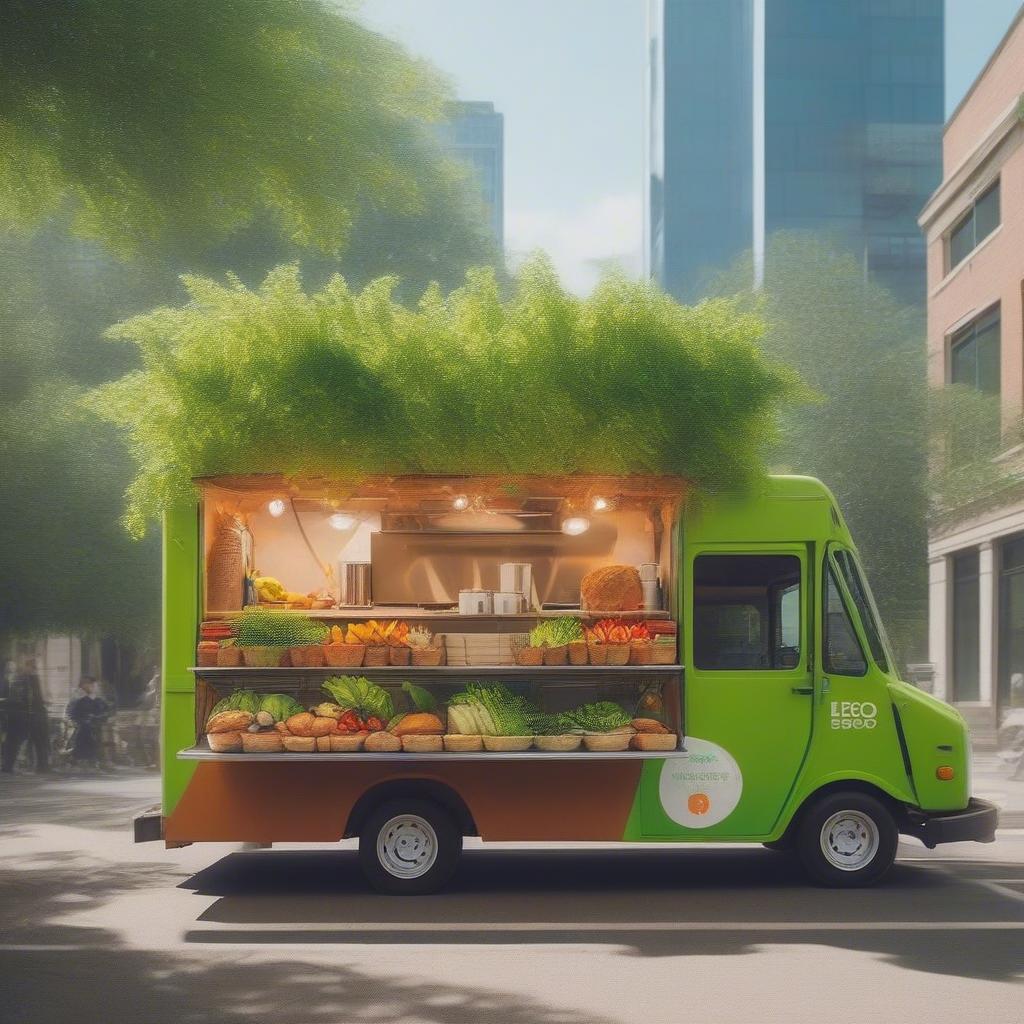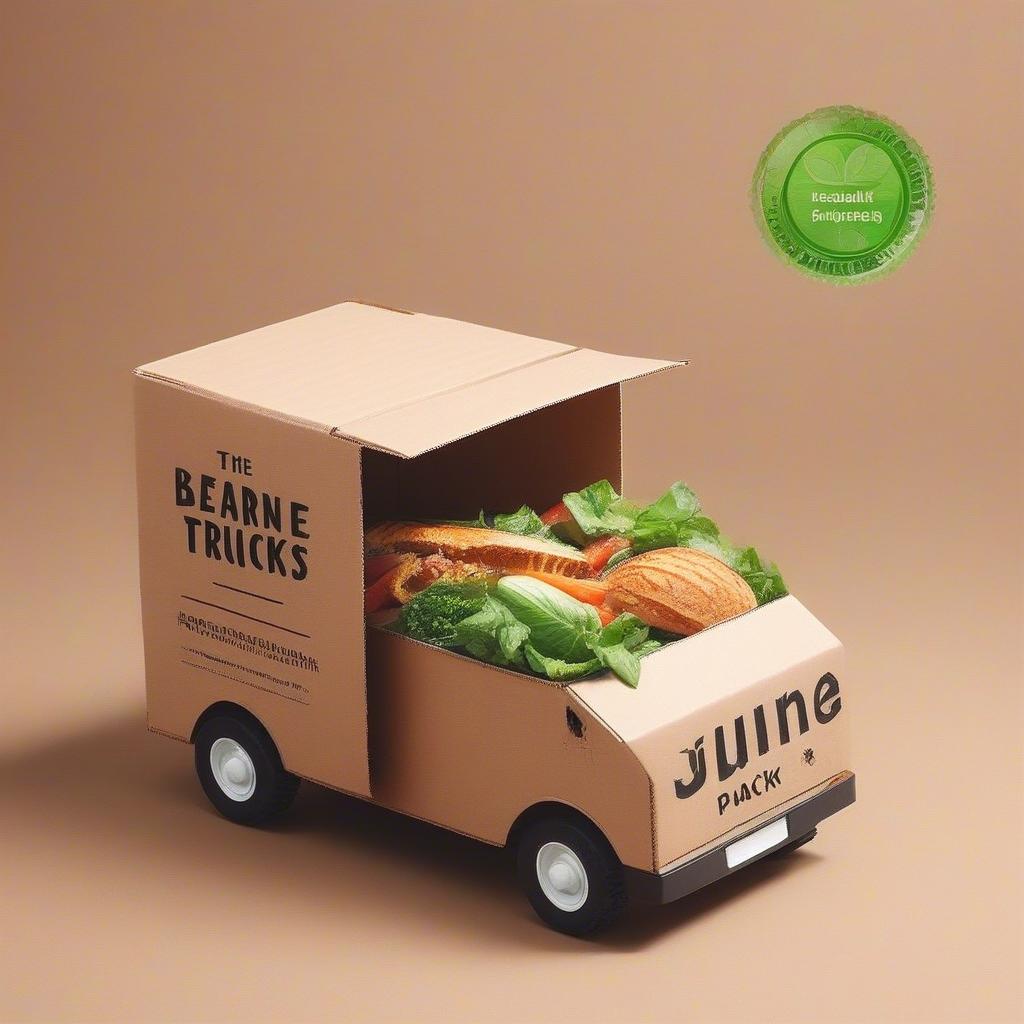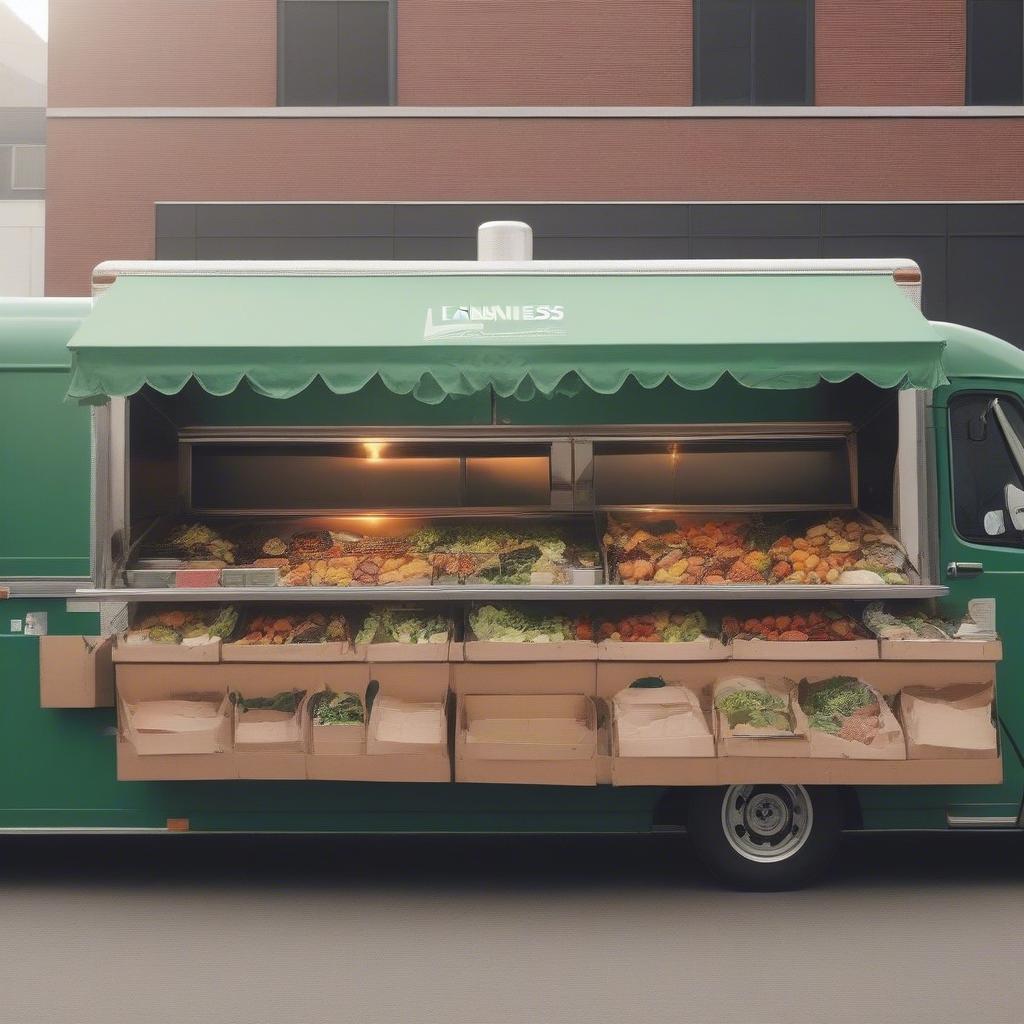
The rumble of the engine, the sizzle of the grill, the aroma of delicious food – food trucks are a vibrant part of our culinary landscape. But as we move towards a more conscious future, it’s vital that these mobile kitchens embrace sustainability. This isn’t just about “going green”; it’s about building a better, more profitable, and resilient business for 2025 and beyond. Let’s dive deep into the world of sustainable food trucks and explore the concrete eco-friendly practices you can implement.
The Why Behind Going Green: More Than Just a Trend
Before we get to the “how,” let’s talk about the “why.” Why should you, as a food truck owner, prioritize green dining?
- Attract the Modern Customer: Today’s consumers are increasingly environmentally conscious. They’re actively seeking out businesses that align with their values. Choosing a food truck that champions sustainability is a powerful purchase driver.
- Boost Your Brand Image: In a competitive market, differentiating yourself is crucial. Being known as a sustainable food truck builds a positive brand image and fosters customer loyalty.
- Reduce Operational Costs: Many eco-friendly practices can actually save you money in the long run. From energy-efficient equipment to minimizing waste, sustainability can positively impact your bottom line.
- Contribute to a Healthier Planet: As a business, you have a responsibility to minimize your environmental footprint. By adopting eco-friendly practices, you’re doing your part to create a more sustainable future.
- Prepare for Future Regulations: As environmental awareness grows, expect stricter regulations around waste, emissions, and resource management. Getting ahead of the curve now ensures a smooth transition in the future.
Key Areas to Focus on for a Sustainable Food Truck
Creating a sustainable food truck requires a holistic approach. Here are the key areas to focus on:
- Energy Efficiency: Minimizing your energy consumption is crucial for reducing your carbon footprint and operational costs.
- Waste Management: Effective waste reduction, reuse, and recycling programs are essential for minimizing your environmental impact.
- Sustainable Sourcing: Choosing eco-friendly suppliers and ingredients is paramount to creating a truly green food truck experience.
- Water Conservation: Implementing measures to reduce water usage helps conserve this precious resource.
- Eco-Friendly Packaging and Serveware: Ditching single-use plastics in favor of compostable or reusable alternatives is non-negotiable for a sustainable food truck.
1. Powering Up: Energy-Efficient Strategies for Your Mobile Kitchen
Your food truck’s energy consumption is a significant area to target for eco-friendly practices. Here’s how you can optimize it:
A. Renewable Energy Sources:
- Solar Panels: Installing solar panels on your truck’s roof can significantly reduce your reliance on generators. They provide a clean, renewable energy source for powering your equipment.
- Implementation Tips: Start with a consultation from a solar panel expert to determine the best size and type of system for your specific needs.
- Example: A food truck in California installed solar panels and now operates entirely off-grid during daylight hours, drastically reducing their fuel costs.
- Portable Solar Generators: These can be a great option if you don’t have the roof space for permanent panels. They offer a flexible and reliable way to power your operations.
- Implementation Tips: Invest in a high-quality generator with adequate wattage to meet the demands of your equipment.
- Example: A small ice cream truck uses a portable solar generator to power its freezer, eliminating the need for a noisy gas generator.
B. Energy-Efficient Equipment:
- LED Lighting: Swap out traditional bulbs for energy-saving LED lights. They consume significantly less power and have a longer lifespan.
- Implementation Tips: Choose LED bulbs with the right color temperature to create a welcoming and appealing atmosphere in your food truck.
- Energy Star Appliances: Look for the Energy Star label when purchasing new refrigerators, freezers, and cooking equipment. These appliances are designed to minimize energy consumption.
- Implementation Tips: Consider the long-term savings when making your equipment purchases. An initial higher cost may be offset by reduced energy bills.
- Induction Cooktops: Induction cooking is more energy-efficient than traditional gas or electric cooktops. They heat up quickly and evenly, reducing cooking time and energy usage.
- Implementation Tips: Ensure you have induction-compatible cookware before switching to an induction cooktop.
C. Smart Power Management:
- Turn off equipment when not in use: A simple yet effective way to save energy is to switch off appliances when they’re not being actively used.
- Implementation Tips: Train your staff to be mindful of energy consumption and implement a checklist to ensure equipment is turned off when it’s not needed.
- Use power strips with switches: Power strips with individual switches allow you to easily turn off multiple devices at once, preventing phantom energy drain.
- Implementation Tips: Invest in high-quality power strips with surge protection to protect your equipment from power fluctuations.
2. Waste Not, Want Not: Implementing Effective Waste Management Strategies
Waste is a major issue for the food industry. For sustainable food trucks, minimizing waste and managing it responsibly is critical.
A. Waste Reduction at the Source:
- Menu Planning: Carefully plan your menu to minimize food waste. Buy only what you need and avoid overstocking ingredients.
- Implementation Tips: Track your inventory closely and adjust your ordering based on your actual sales.
- Example: A food truck offering customizable bowls allows customers to choose only the ingredients they want, reducing the likelihood of throwing away uneaten portions.
- Utilize Whole Ingredients: When possible, use the entire ingredient. For example, vegetable scraps can be used to make broth or stock.
- Implementation Tips: Train your staff on techniques for utilizing whole ingredients and create recipes that minimize waste.
- Proper Portioning: Serve appropriate portions to minimize food waste from uneaten meals.
- Implementation Tips: Provide portion control guides for your staff to ensure consistent serving sizes.
B. Composting:
- On-site Composting: If you have the space, consider setting up a small composting system to turn food scraps into nutrient-rich soil.
- Implementation Tips: Research different composting methods and choose one that’s suitable for your space and needs.
- Partner with a Local Composting Facility: If on-site composting isn’t feasible, find a local composting facility that will accept your food waste.
- Implementation Tips: Research local composting services and choose one that offers convenient and affordable collection options.
C. Recycling:
- Clearly Marked Recycling Bins: Provide easily accessible and clearly labeled recycling bins for customers and staff.
- Implementation Tips: Use color-coded bins and labels to make it easy for everyone to sort waste correctly.
- Educate Customers on Recycling: Use signage and messaging to educate customers about what can and cannot be recycled.
- Implementation Tips: Consider adding recycling instructions on your menu or on the side of your truck.
3. Sourcing with Integrity: Prioritizing Sustainable Ingredients
The quality of your ingredients directly impacts the quality of your food and your sustainability. Here’s how to source responsibly for a sustainable food truck.
A. Local and Seasonal Sourcing:
- Partner with Local Farmers: Buy ingredients directly from local farmers whenever possible. This reduces transportation emissions and supports local economies.
- Implementation Tips: Visit local farmers markets and connect with farmers in your area.
- Example: A food truck serving tacos prioritizes sourcing local, seasonal produce from nearby farms, showcasing the freshest ingredients in their dishes.
- Seasonal Menus: Create menus that highlight seasonal ingredients. This ensures freshness and supports sustainable agricultural practices.
- Implementation Tips: Adjust your menu regularly to feature the best available seasonal produce.
B. Ethical and Fair-Trade Practices:
- Fair-Trade Coffee and Chocolate: Choose coffee and chocolate that are certified as fair trade. This ensures that producers receive fair compensation for their work.
- Implementation Tips: Look for fair-trade certification labels when purchasing these products.
- Ethically Raised Meat and Poultry: Source meat and poultry from farms that follow ethical and sustainable farming practices.
- Implementation Tips: Research different farms and choose ones that prioritize animal welfare and environmental sustainability.
C. Minimizing Transportation Emissions:
- Order in Bulk: Whenever possible, order ingredients in bulk to reduce the frequency of deliveries.
- Implementation Tips: Negotiate favorable pricing and delivery schedules with your suppliers.
- Optimize Delivery Routes: Work with your suppliers to optimize delivery routes, minimizing transportation emissions and fuel costs.
- Implementation Tips: Use route optimization software to plan efficient delivery schedules.
4. Conserving Water: Smart Water Management Strategies
Water is a precious resource, and sustainable food trucks need to be mindful of its usage.
A. Water-Saving Equipment:
- Low-Flow Faucets and Sprayers: Install low-flow faucets and sprayers to reduce water consumption.
- Implementation Tips: Choose fixtures with WaterSense certification to ensure they meet water efficiency standards.
- Water-Efficient Dishwashing: Use water-efficient dishwashers and train staff on how to properly load them to maximize water conservation.
- Implementation Tips: Consider using a closed-loop system for dishwashing to further reduce water usage.
B. Water-Wise Practices:
- Minimize Water Usage: Implement practices to minimize water usage during food preparation and cleaning.
- Implementation Tips: Train your staff to be mindful of water usage and use efficient cleaning techniques.
- Capture Rainwater: Consider installing a system to capture rainwater for non-potable uses, such as washing your truck.
- Implementation Tips: Research local regulations and choose a rainwater harvesting system that’s appropriate for your needs.
5. Serving Sustainably: Eco-Friendly Packaging and Serveware
Single-use plastics are a major environmental issue. As a sustainable food truck, it’s imperative to use eco-friendly packaging and serveware.
A. Compostable Options:
- Plant-Based Containers: Use compostable containers made from plant-based materials, such as sugarcane or bamboo.
- Implementation Tips: Ensure that the compostable containers you choose are certified by a reputable organization.
- Compostable Cutlery: Opt for compostable cutlery made from materials like bamboo or bioplastics.
- Implementation Tips: Choose compostable cutlery that’s durable and can withstand the temperatures of your food.
B. Reusable Options:
- Dine-In Options: Offer reusable plates and cutlery for customers who are dining in at your truck.
- Implementation Tips: Invest in durable, easy-to-clean reusable serveware.
- Encourage Customers to Bring Their Own Containers: Offer discounts or incentives for customers who bring their own containers.
- Implementation Tips: Promote this option on your menu and through signage.
C. Avoiding Single-Use Plastics:
- Ban Plastic Straws: Eliminate the use of plastic straws. Offer biodegradable straws or encourage customers to drink directly from the cup.
- Implementation Tips: Consider offering stainless steel or bamboo straws for purchase.
- Ditch Plastic Bags: Use paper bags or encourage customers to bring their own reusable bags.
- Implementation Tips: Offer branded reusable bags for sale, generating additional revenue.
The Future is Green: Embracing Sustainability as a Competitive Advantage
Embracing eco-friendly practices isn’t just about being environmentally responsible; it’s about building a thriving and future-proof business. By implementing the strategies outlined above, you can create a sustainable food truck that resonates with today’s conscious consumers, reduces your operational costs, and contributes to a healthier planet. Remember, going green isn’t a one-time fix; it’s a continuous journey of learning, adapting, and improving.
Learn Business: Your Partner in Sustainable Growth
At Learn Business, we understand that transitioning to sustainable practices can feel overwhelming. That’s why we provide the guidance and resources you need to create a truly sustainable food truck. We offer:
- Tailored Business Templates: We have a range of customizable templates designed specifically for food trucks. These templates cover everything from menu planning and inventory management to waste reduction and sustainability plans.
- Expert Guidance: Our team of experienced professionals can provide personalized advice and support to help you navigate the complexities of building a green business.
- Practical Strategies: We offer practical, actionable strategies to help you implement sustainable practices effectively and efficiently.
- Community Support: Connect with other like-minded entrepreneurs in our community and learn from their experiences.
- Resources and Tools: Access our extensive library of resources, including checklists, guides, and toolkits, to support your sustainability journey.
Learn Business is committed to empowering entrepreneurs to build successful and sustainable businesses. Let us help you transform your food truck into a model of green dining. By embracing eco-friendly practices, you’re not just creating a better business; you’re creating a better future. Invest in your future. Invest in sustainability. Invest in Learn Business.



Leave a Reply